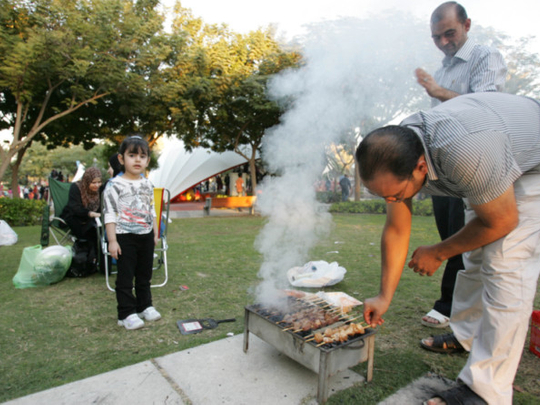
DUBAI: There’s a nip in the air and we all think the time is perfect to to head to the park for a barbeque, thinking all is well. You would be surprised that your pleasant outing could turn into a nightmare if you are not cautious enough while handling your food.
The risk of getting a food-borne illness is as high at this time of year as it is in the peak of summer.
In Dubai the risk of cross contamination and temperature abuse of food is higher during the October-February as more people engage in outdoor activities and picnics during this season.
Latest data from the Dubai Municipality dispels the myth that the risk of food-borne diseases decreases in winter.
According to the data, the number of food-borne illnesses recorded last January was 120 compared to 80 in August, illustrating that risk remains almost the same throughout the year. A total of 1,053 (confirmed and suspected) cases of food-borne illnesses were detected in the first three quarters of 2012.
“People in the region engage in barbeque parties, desert, beach outings, etc, more during winter. They tend to carry food in large quantities when they go out, usually in the mornings, and the food is kept in cars or outside for long hours before it is consumed. Particularly in case of cooked rice, meat and salads, bacteria can multiply in it and cause illness,” said Bobby Krishna, the municipality’s Senior Food Studies and Surveys Officer in the Food Control Department. “We need to understand that even though the temperature drops, it is still not low enough to keep the danger of bacteria away,” he added.
The common perception that there is little risk of getting a food-borne illness during winter months does not hold good for this region, say food safety experts.
Different climate
“The number of food-borne illnesses declines during winter in European countries, but we need to understand that we are living in different climatic conditions and cannot compare ourselves to colder countries,” said Basheer Hassan, Food Safety Expert at the municipality.
Food should be kept below 5 degrees or above 60 degrees C to ensure that it does not get spoilt. Experts also advise keeping raw food separately from cooked food in order to prevent cross contamination.
“Many times salads and cooked food are kept together, which could lead to cross contamination. During a barbeque the risk rises if raw and cooked food is handled at the same time. Also, many times children, for instance, insist on eating early and the food is not properly cooked. This too could lead to problems. Hygiene is another factor that needs to be kept in mind,” added Hassan.











